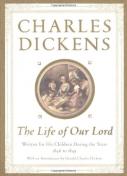BKMT READING GUIDES
The Life of Our Lord: Written for His Children During the Years 1846 to 1849
by Charles Dickens, Gerald Charles Dickens
Hardcover : 128 pages
2 clubs reading this now
0 members have read this book
Charles Dickens wrote The Life of Our Lord during the years 1846-1849, just about the time he was completing David Copperfield. In this charming, simple retelling ...
Introduction
Charles Dickens's other Christmas classic, with a new introduction by Dickens's great-great-grandson, Gerald Charles Dickens.
Charles Dickens wrote The Life of Our Lord during the years 1846-1849, just about the time he was completing David Copperfield. In this charming, simple retelling of the life of Jesus Christ, adapted from the Gospel of St. Luke, Dickens hoped to teach his young children about religion and faith. Since he wrote it exclusively for his children, Dickens refused to allow publication.
For eighty-five years the manuscript was guarded as a precious family secret, and it was handed down from one relative to the next. When Dickens died in 1870, it was left to his sister-in-law, Georgina Hogarth. From there it fell to Dickens's son, Sir Henry Fielding Dickens, with the admonition that it should not be published while any child of Dickens lived.
Just before the 1933 holidays, Sir Henry, then the only living child of Dickens, died, leaving his father's manuscript to his wife and children. He also bequeathed to them the right to make the decision to publish The Life of Our Lord. By majority vote, Sir Henry's widow and children decided to publish the book in London. In 1934, Simon & Schuster published the first American edition, which became one of the year's biggest bestsellers.
Editorial Review
Charles Dickens wrote The Life of Our Lord around the same time he was finishing up David Copperfield, but to readers raised on a diet of Dickensian wit and indignation, his rendering of Jesus' life may come as something of a surprise. You won't find even the shadow of a Micawber or a Mrs. Gamp anywhere in this brief volume; no Pecksniffs, Podsnaps, or Mulberries, either. Instead, Dickens approaches his subject with simple reverence, retelling the New Testament in a manner suitable for his own young children--who were, in fact, his only intended audience. Indeed, he strictly forbade publication of The Life during his lifetime and begged his sister to make sure that they "would never even hand the manuscript, or a copy of it, to anyone to take out of the house." It wasn't until the death of Dickens's last living son that the manuscript was finally published in 1934. Though he left his trademark comedy behind, Dickens's liberal social conscience is still evident in what he chooses to emphasize about Jesus: "My Dear Children," he begins,I am very anxious that you should know something about the History of Jesus Christ. For everybody ought to know about Him. No one ever lived who was so good, so kind, so gentle, and so sorry for all people who did wrong, or were in any way ill or miserable, as He was.This is a simple, straightforward account of Jesus' life and teachings, with an occasional touch of whimsy: "You never saw a locust, because they belong to that country near Jerusalem, which is a great way off. So do camels, but I think you have seen a camel. At all events, they are brought over here, sometimes; and if you would like to see one, I will show you one." Occasionally, Victorian attitudes and prejudices creep through--Dickens writes that the Jewish Sabbath was Sunday, that Jews were "very ignorant and passionate," and also that "they were very proud, and believed that no people were good but themselves." Fortunately, such comments are few and far between, and for the most part the author focuses on the miracles Jesus performed and on the lessons in charity, forgiveness, and compassion that Christians can take away from them. This may not be among the greatest of Charles Dickens's literary accomplishments, but it is certainly one of his most heartfelt. --Sheila Bright
Discussion Questions
No discussion questions at this time.Book Club Recommendations
Recommended to book clubs by 0 of 0 members.
Book Club HQ to over 90,000+ book clubs and ready to welcome yours.
Get free weekly updates on top club picks, book giveaways, author events and more








